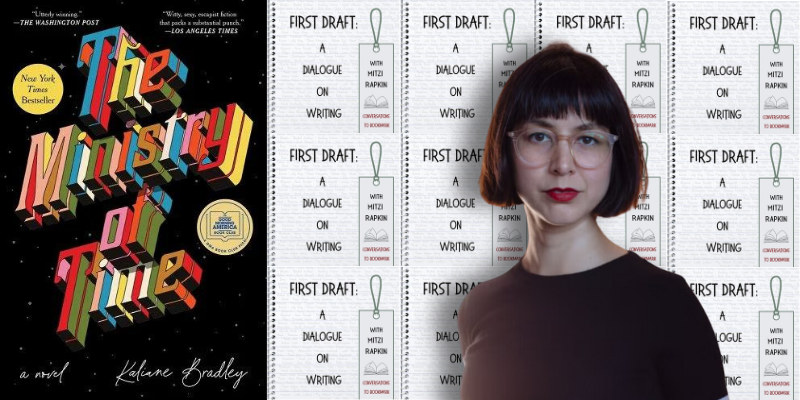
Kaliane Bradley on the Slow-Moving Crisis of Identity
In Conversation with Mitzi Rapkin on the First Draft Podcast
First Draft: A Dialogue of Writing is a weekly show featuring in-depth interviews with fiction, nonfiction, essay writers, and poets, highlighting the voices of writers as they discuss their work, their craft, and the literary arts. Hosted by Mitzi Rapkin, First Draft celebrates creative writing and the individuals who are dedicated to bringing their carefully chosen words to print as well as the impact writers have on the world we live in.
In this episode, Mitzi talks to Kaliane Bradley about her new novel, The Ministry of Time.
Subscribe and download the episode, wherever you get your podcasts!
From the episode:
Mitzi Rapkin: I’m curious if writing this expanded or changed anything for you about identity and how we see identity, because I think for your narrator, you know, she’s very thoughtful about her identity, and how being mixed race impacts how she’s seen by other people she works with and how the world sees her. But there’s a point where one of the characters, Margaret, who time travelled from the time of The Great Plague. She’s gay, and she’s really living it up in modern times with Tinder, and she’s assimilating, I guess with a big A and it hasn’t been traumatic for her. She likes it but another character, Graham, a polar explorer who is now in modern day, says to the main character, Why is identity our habits? Why is identity reducing us to our habits? And he was talking about sexuality, but I think so much of this novel is about identity. Did that change anything for you about how you looked at it from the beginning to the end of writing this?
Kaliane Bradley: Well, reading about Victorian conceptions of sexuality was incredibly interesting, because also, how would these people have described themselves? And so yes, the idea that Graham’s horror that what you do with someone else becomes what you are, is very alarming to him, because I think he thinks of himself in a very fixed way that maybe is not borne out by his behavior. I think I am in a constant state of slow-moving crisis about the term, for example, British-Cambodian writer. What does that mean for me? Does that mean, does the British-Cambodian come first? Does the writer come first? Do I always have to modify them? Will I always have to modify them? Will it always mean something essential to the book? I feel like in this case, maybe it is essential, because one of the characters is British-Cambodian, and that’s a crucial part of how she experiences her story. But if I write something completely different, Will is it still relevant that I am a British-Cambodian writer, or will it continue to be relevant because I simply cannot escape my history, my past, my current identity. I feel that maybe before I started writing the book, my crisis was more subdued. And it’s an interesting crisis. It’s an enjoyable crisis. I’m glad I’m having it. I hope it will yield some interesting questions, but writing this book, and thinking about the categorizing urge, the urge to fit people into a pigeonhole in order to better comprehend them, has been interesting, is the word I’m going to use. But I think it’s also been fun and complicated and crunchy and weird.
***
Kaliane Bradley is a British-Cambodian writer and editor based in London. Her short fiction has appeared in Somesuch Stories, The Willowherb Review, Electric Literature, Catapult, and Extra Teeth, among others. She was the winner of the 2022 Harper’s Bazaar Short Story Prize and the 2022 V.S. Pritchett Short Story Prize. Her novel is called The Ministry of Time.
First Draft: A Dialogue on Writing
First Draft: A Dialogue on Writing is a literary podcast produced and hosted by Mitzi Rapkin. Each episode features an in-depth interview with a fiction, non-fiction, essay, or poetry writer. The show is equal parts investigation into the craft of writing and conversation about the topics of an author’s work.



















